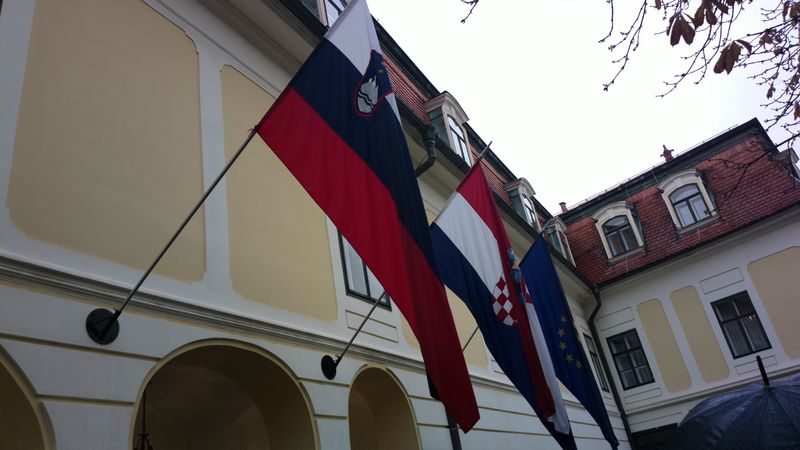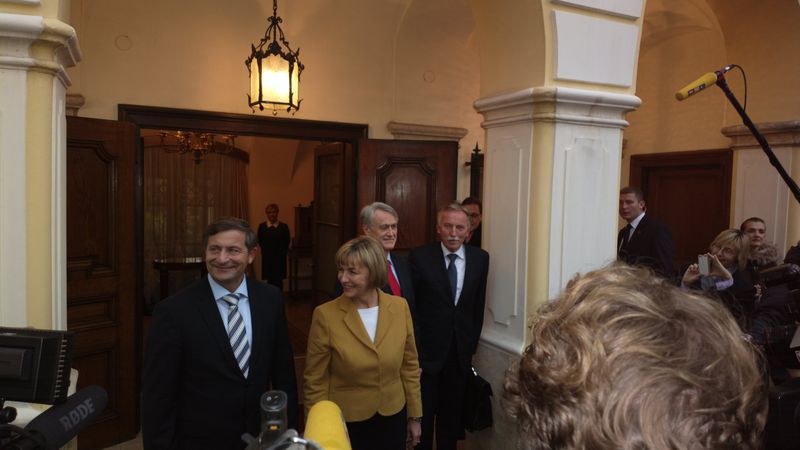The Ljubljanska Banka Issue between Croatia and Slovenia Is again Open
Adelina Marini, November 22, 2013
 It took only nine months to allow a decades long post-Yugoslav problem to surface again on the agenda. This is the issue of the transferred deposits from the former Ljubljanska banka which Slovenia and Croatia have been arguing upon for years. The conflict threatened Croatia's accession to the EU on July 1st this year because Ljubljana was refusing to ratify the Croatian accession treaty until a solution to the problem is found. A solution was not found, but an agreement was achieved on the framework within which a solution will be sought after the problem is "imported" in the EU. In the beginning of March this year the prime minsters of the two countries, the then Slovenian PM Janez Jansa and Croatia's Zoran Milanovic, signed a memorandum of four points.
It took only nine months to allow a decades long post-Yugoslav problem to surface again on the agenda. This is the issue of the transferred deposits from the former Ljubljanska banka which Slovenia and Croatia have been arguing upon for years. The conflict threatened Croatia's accession to the EU on July 1st this year because Ljubljana was refusing to ratify the Croatian accession treaty until a solution to the problem is found. A solution was not found, but an agreement was achieved on the framework within which a solution will be sought after the problem is "imported" in the EU. In the beginning of March this year the prime minsters of the two countries, the then Slovenian PM Janez Jansa and Croatia's Zoran Milanovic, signed a memorandum of four points.
In it both countries commit to seek a solution to the transferred deposits of Croatian citizens from the third largest bank in former Yugoslavia in the framework of the succession agreement. It was also agreed to seek the mediation of the Bank for International Settlements. Until a solution is found, the two countries commit to ut on stand by the trials against each other in the courts. In the case of Croatia two banks sue Slovenia demanding compensations for the paid deposits of Croatian citizens with guarantees from the Croatian government. Those are the Zagrebacka banka and Privredna banka Zagreb. In exchange, the Slovenian party committed to ratify the accession treaty.
The memorandum was formally signed at a ceremony in the Slovenian town of Mokrice literally in the last hours of Janez Jansa's government, which fell after a no confidence vote. Mr Jansa's strife then was to ensure the ratification of the Croatian accession treaty because the political crisis in the country was threatening to block the process for an unlimited time.
Quite recently, however, Slovenia sent a diplomatic note to Zagreb, calling on the Croatian government to stick to the agreement. Zagreb has responded that it implemented every point of it and returned the appeal - Slovenia to respect what has been agreed. Around the diplomatic exchange it became clear that there is a misunderstanding on point two in the memorandum. The first misunderstanding stems from the fact that in the text of the document the word 'stay' is used which can be interpreted as a "reeze" of court proceedings against the Slovene state. This is exactly how the Croatian government is interpreting the word. But for Ljubljana this means a "suspension". The second misunderstanding stems from the fact that according to Croatian law, the 'stay' cannot continue more than a year with an option of one more year. Slovenia, however, expected the stay to last until a durable solution is found within the framework of the succession agreement.
Croatia's first Deputy Prime Minster and Minister of Foreign and European Affairs Vesna Pusic has claimed that the Slovene side was very well acquainted with this legal constraint. Her Slovene counterpart, also a deputy prime minister, Karl Erjavec believes, however, that it had to be written in the memorandum. The two met on Wednesday (November 20th) in Zagreb for two hours in the presence of the two financial experts who tried to find a mutually acceptable solution during a series of meetings. At their joint news conference after the meeting it became clear that their positions not only had not approximated, but are drifting away. Apart from stating that Croatia sticks to its commitments, Ms Pusic again put on the agenda the idea the dispute to be solved via arbitration and not in the framework of the succession agreement, signed by all former Yugoslav republics in 2001.
The reason is that if the issue is tackled within the succession treaty this will require the consent of all the former Yugoslav republics, while with the arbitration all will be forced to accept the decision of the arbitration, whatever it is. The Slovene foreign minster left Zagreb feeling he was betrayed by Croatia. Journalist from the small Alp republic was asking why Croatia had not ratified in Parliament the international agreement as Slovenia did. Ms Pusic corrected that the memorandum was not an international agreement, but an international act which was adopted at government level and never passed through the parliaments of the two countries. The reason was that the ratification of Croatia's  treaty could not be put as a condition into an international agreement because it was an obligation according to the European legislation.
treaty could not be put as a condition into an international agreement because it was an obligation according to the European legislation.
Not only the positions of the two countries are drifting away, but for now no specific steps are envisaged to be taken to resolve the problem. Croatia claims it is fully open for any solutions and Deputy Prime Minster Pusic emphasises several times that the option for arbitration was on the table. For now no new meetings are envisaged. In Pusic's words, the two ministers had not agreed how to solve the problem, but only to stay in communication whatever that means.
 Kolinda Grabar-Kitarovic | © KGK
Kolinda Grabar-Kitarovic | © KGK Jozo Rados | © European Parliament
Jozo Rados | © European Parliament Aleksandar Vucic, Andrej Plenkovic | © Vlada RH
Aleksandar Vucic, Andrej Plenkovic | © Vlada RH